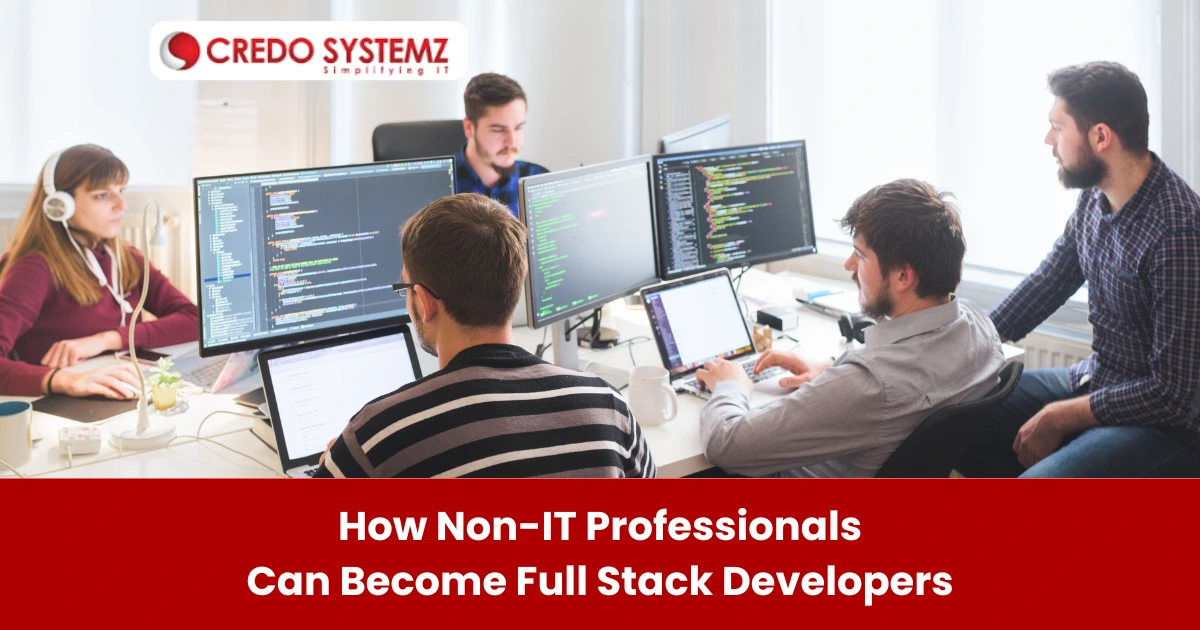
Non-IT Professionals Can Become Full Stack Developers
The increased growth of the digital world attracts non-IT professionals towards tech careers. Full stack development is one of the most sought-after roles in the tech field. If you are interested in switching your career to full stack, this guide assists in making the switch to becoming a full-stack developer successfully.
Why Full-Stack Development?
The Full stack development is a popular career choice that promises competitive salaries, career growth and opportunities to work on diverse projects.
Full stack developers are skilled in building complete web applications using front-end (user interface) and back-end (server-side) technologies. They are valuable assets to tech teams, startups, and businesses with their versatile skills set. The average salary of any Full Stack Developer in India is ₹29.7 lakhs per annum.
Steps to Transition from a Non-IT Role to Full-Stack Development
The important steps involved in transiting the career of Non-IT professionals into full stack development are:
- Understanding about the roles and responsibilities of full stack developers,
- Leveraging the transferable skills,
- Start with the Basics of Web development,
- Developing the Programming Skills for the Back-end,
Roles and Responsibilities of full stack developers:
To dive into full-stack development, it’s essential to know about the responsibilities in the job. A full-stack developer works to build web applications with multiple technologies across different layers of web development.
- Front-end development: HTML, CSS, and JavaScript for creating user interfaces.
- Back-end development: Server-side languages like Node.js, Python, Ruby, or PHP.
- Databases: Knowledge of SQL (MySQL, PostgreSQL) or NoSQL (MongoDB) databases.
- Version Control: Tools like Git for managing code changes.
- Deployment and management of the application in the long run.
Leveraging the Transferable Skills
From a non-IT background, many skills from other fields can be applied to full-stack development. The transferable skills are:
- Project management skills,
- Problem solving ability,
- Communication skills.
Problem-solving ability is essential for designing system architecture and debugging processes with troubleshooting and analytical thinking.
Project management skills help in planning, organizing, executing and managing projects.
Communication skills are necessary to work closely with cross-functional teams, including designers, project managers, and clients.
Start with the Basics of Web development and front-end development
Mastering the basics of web development is essential to build solid foundation on the building blocks of the website, like:
- HTML & CSS
- JavaScript
To learn front-end development, master the any of the frameworks like React JS, Angular along with:
- CSS frameworks
- Responsive design
- Restful APIs
- JSON
- Testing and deployment
Developing the Programming Skills for the Back-end
To learn back-end programming, choose any one of the popular languages for beginners.
- JavaScript/Node.js: If you are comfortable in working with JavaScript, use Node.js on the server-side.
- Python: With readability and simplicity, python is a great choice for beginners.
- Ruby on Rails: Beginner-friendly framework that makes development smoother.
After learning a back-end language, dive into databases like MySQL or MongoDB to manage data effectively.
Build Real time Projects
The best way to reinforce the learning is to build projects to apply the learning skills. Start small, such as a simple application then move on to more complex applications. Practice interaction with databases, user authentication, and deploying the site online.
Benefits of Building Projects:
- To gain hands-on experience by applying the learned knowledge in a real-world context.
- Showcase the skills with attractive portfolio creation which is useful for job hunting.
- Working on projects will help to gain the experience in handling common coding challenges to become a better developer.
Take a Look: Full Stack Development Project Ideas
Enroll in a Full-Stack Development Course
Credo systemz is the best platform that provides the full stack developer course in Chennai. By structured learning, industrial experts help the students to master full stack development to accelerate their career. The full stack developer courses are affordable, placement oriented and equip you with the skills needed to land in a job in the tech field.
Practice Problem-Solving with Coding Challenges
Regular practice of coding will sharpen your problem-solving skills. from beginner to advanced levels. The practical exercises can help you think algorithmically and prepare for technical interviews. Learn front-end and back-end by practicals to gain coding skills.
Prepare for Job Interviews
It is time to start applying for tech jobs. Full-stack developer interviews include:
- Technical assessments: To test your knowledge of coding languages, algorithms, and problem-solving.
- Behavioral interviews: Assessing how well you can work in a team, manage deadlines, and handle challenging scenarios.
- Portfolio review: Prepare ATS friendly resume and ready to discuss the projects you’ve built, explaining the technologies you used and the challenges you faced.
Take a Look: Full Stack Developer Interview Questions with Answers
Conclusion
To sum up, switching careers to become a full-stack developer is not challenging and can be achieved with a clear plan and commitment. By learning the basics, building projects, and regular practice, build a successful career in web development. Credo systemz full stack developer course in Chennai assists the Non-IT professionals to transit into the IT field.
